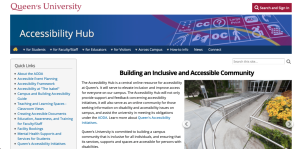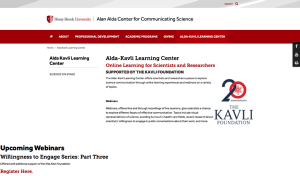Theme: Accessibility
Back to Top
|
 |
|
How to Be a Better Ally, With Disability Advocate Alice Wong
|
Social studies |
|
On The Upgrade, a podcast from Lifehacker, co-hosts Alice Bradley and Jordan Calhoun and their guests give listeners how-to guides on "the stuff that matters." On this episode, the duo and guest Alice Wong discuss an incredibly important topic: disability rights and allyship. Readers will likely recognize Alice Wong from the Disability Visibility Project, a fantastic resource included in the 05-29-2020 Best of the Scout Report issue. In addition to directing the Disability Visibility Project, Wong is an author, activist, and consultant. Here, Wong shares how able-bodied individuals can recognize their privilege and show up for people with disabilities. Additionally, the conversation focuses on COVID-19's influence on disability rights. A universal takeaway from the episode is that accessibility does not only benefit disabled people; it benefits everyone. Check out the link above to read some key quotes, listen to the embedded audio, and find links to other various places to tune in (Apple Podcasts, Google Play, Spotify, iHeartRadio, and NPR One). [EMB] |
|





|
|
 |
|
Accessibility Hub
|
Social studies |
|
Courtesy of Queen's University, located in Kingston, Ontario, Canada, Accessibility Hub invites users to be an "Access Ally." Some of the materials are specific to the campus, with accessibility tools for faculty, students, and visitors. However, the How-to Info tab contains a bevy of general tools. Here, readers will find resources for designing accessible websites, social media accounts, events, and more. The document tools are particularly insightful. Designed for Windows and Mac users, the guides discuss proper formatting, styles, and visuals to ensure that documents (Word, PDF, and PowerPoint) are obtainable and navigable for all readers. In addition to in-depth information, users will find quick reference guides and checklists, helpful for a final proofing of documents. Readers should note that the primers are designed to comply with the Accessibility for Ontarians with Disabilities Act. The Accessibility Hub is also on social media; check out @AccessHubQU on Instagram and Twitter for more. [EMB] |
|





|
|
 |
|
Web Axe
|
Science |
|
"What is web accessibility?" Find an answer, along with plenty of tips and tools to cultivate the practice, on Web Axe. Formerly a podcast and blog, and now focused on the latter initiative, Web Axe is a great resource for anyone responsible for creating online content. Unfortunately, web accessibility has actually decreased in recent times, so it is more important than ever to design with accessibility in mind. Luckily, the wealth of ideas on this site are here to help. For example, readers will find an overview of Google Chrome and Chromium features that allow users to test the accessibility of their designs. Additionally, several posts highlight useful articles, studies, and materials about web accessibility, helping readers expand their trove of resources. Plus, readers in the digital accessibility field may benefit from the occasional job round-up posts, which highlight openings all over the world. Web Axe was founded by Dennis Lembree in 2005, and the podcast was co-hosted with Ross Johnson. [EMB] |
|





|
|
 |
|
Canadian Council on Rehabilitation and Work: Children's Books on Inclusion
|
Language Arts |
|
Recognizing the need for more children's books that emphasize inclusion, the Canadian Council on Rehabilitation and Work, a nonprofit organization supporting persons with disabilities, created six open-access options. The books are available in English, French, American Sign Language (ASL), and Quebec Sign Language (LSQ) (note that braille copies of books are also available to order for a small fee). Additionally, readers can download the books as PDFs, in audiobook format (as an MP3 or WAV file) or video format (with sign language), or as iPad and Kindle files. Along with these various mediums, the books encompass various themes. For example, Felicia McCan, written by Carolyn MacDiarmid and illustrated by James Tuer, celebrates inclusion. I'm Smart in My Own Way, created by the same duo, reminds readers that everyone has unique talents. I'm Wendy Blair, Not a Chair!, also written by Carolyn MacDiarmid and illustrated by Sarah Ennals, is designed to undo misconceptions about disabilities. These books were funded by the Accessibility Directorate of Ontario (ADO) as part of the Government of Ontario's Ontario 150 Partnership Program. [EMB] |
|





|
|
 |
|

















